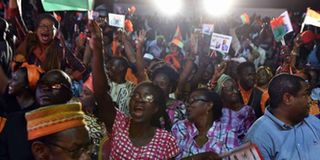New Burkina Faso president vows a brighter future after a year of political turmoil and unrest

Supporters of Burkina Faso's new president Roch Marc Kabore celebrate at their party headquarter in Ouagadougou on December 1, 2015 after winning Burkina Faso's presidential election, after a year of unrest. PHOTO | ISSOUF SANOGO |
What you need to know:
- Mr Kabore won 53.49 per cent of ballots cast in Sunday’s election, winning in the first round of a vote aimed at restoring stability after the popular revolt that toppled long time leader Blaise Compaore in October 2014.
- His nearest rival Zephirin Diabre, who scored 29.65 per cent, conceded victory before the results were released.
- Mr Kabore, a former banker seen as a consensus figure by some and an opportunist by others, has pledged to build “a new Burkina Faso” by fighting youth unemployment, improving education and modernising the health system.
OUAGADOUGOU, Tuesday
Roch Marc Kabore became Burkina Faso’s first democratically elected leader in nearly four decades on Tuesday, vowing a brighter future for the western African country after a year of political turmoil and unrest.
Mr Kabore won 53.49 per cent of ballots cast in Sunday’s election, winning in the first round of a vote aimed at restoring stability after the popular revolt that toppled long time leader Blaise Compaore in October 2014.
“We must get to work immediately,” 58-year-old Kabore, a former prime minister under Compaore who later broke ranks with the exiled ex-president, told several thousand supporters outside his party headquarters in the early hours of Tuesday.
“Together we must serve the country,” he said, pledging his determination “to open up opportunities for a better tomorrow”.
His nearest rival Zephirin Diabre, who scored 29.65 per cent, conceded victory before the results were released.
Mr Kabore expressed his “warm congratulations” to the transitional government that has run the west African country since a popular revolt deposed Mr Compaore after he tried to change the constitution to extend his 27-year rule.
UNREST
The people returned to the streets in September 2015 to protest a short-lived putsch by Compaore loyalists in the presidential guard.
That unrest forced presidential and parliamentary elections to be delayed but Sunday’s vote went off largely without incident, with voters hungry for change standing in long lines to cast their ballot.
The head of the electoral commission, Mr Barthelemy Kere, described the election as “generally satisfactory” despite “a few anomalies” and said turnout was strong in all of the country’s 45 provinces.
Burkina Faso’s 18 million people, most of whom live in grinding poverty, are hoping the election will usher in a long era of peace and democracy, ending the periodic coups that have marked the country’s history.
NEW COUNTRY
Mr Kabore, a former banker seen as a consensus figure by some and an opportunist by others, has pledged to build “a new Burkina Faso” by fighting youth unemployment, improving education and modernising the health system.
“We have had a total rupture with the old system,” Mr Kabore said Sunday, pledging to “bring real change to the country”.
For over a decade he led the ruling Congress for Democracy and Progress (CDP) party and was seen as Compaore’s likely heir, but fell out with the strongman in 2012 and last year formed his own opposition party.
His win on Sunday was seen as proof of his appeal among both supporters and opponents of Compaore — now exiled in Cote d’Ivoire — as well as both urban and rural dwellers.
Michel Kafando, leader of the transitional regime, praised the vote as “a victory... for the Burkinabe people”.
It was “the first fully democratic, transparent” election since 1978, when the former French colony was still known as Upper Volta, Kafando said.
“We’re smiling broadly, we’re sighing with relief,” said Halidou Ouedraogo, chairman of CODEL, the civil society platform monitoring the election.
“The Burkinabe people rose to the challenge of holding these historic elections in a calmer atmosphere.
UN Secretary-General Ban Ki-moon hailed the election’s “peaceful atmosphere” as well as the “strong participation of women in the electoral process,” his spokesman Stephane Dujarric said.
The CDP was barred from fielding a candidate in the presidential poll under a contested law that prevented anybody connected with Compaore’s attempts to cling to power from seeking office.




